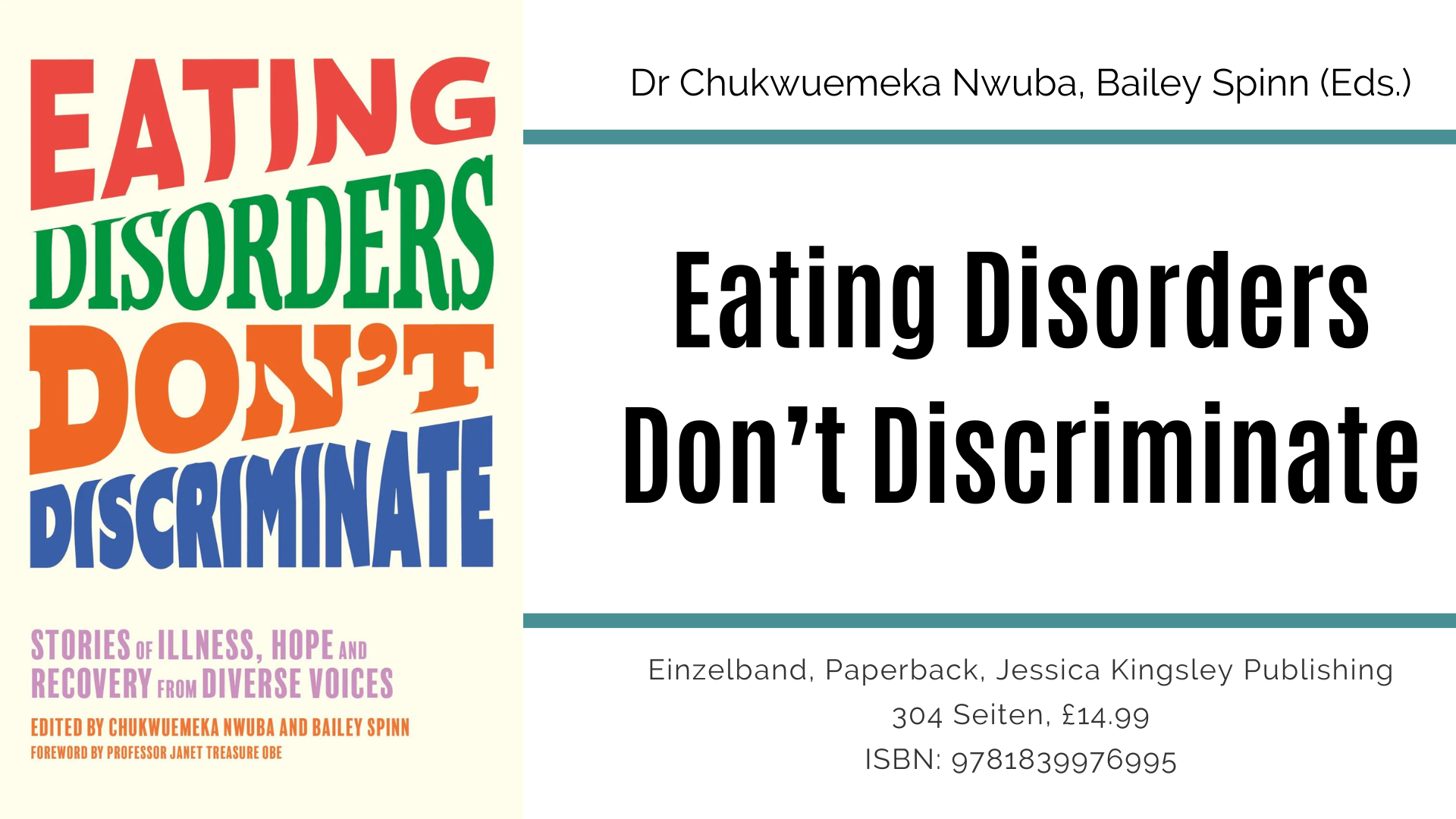Eating disorders know no boundaries. They don’t discriminate.
Every story of living with an eating disorder is unique. Eating Disorders Don’t Discriminate brings together thirty-one of them, each tackling the stereotypes and misconceptions about what eating disorders look like and who they impact.Athletes, activists, directors, models, health professionals, and more share their experiences of eating disorders, including binge eating disorder, bulimia nervosa, anorexia nervosa, ARFID and OSFED, and highlight the complexities of how race, gender, culture and social media can influence our experiences of body and food.
Compiled by Dr Chuks Nwuba, who has cared for some of the UK’s most unwell eating disorder patients, and TikToker and eating disorder advocate Bailey Spinn, this stirring anthology is one of hope and encouragement for anyone who feels misunderstood and underrepresented.
Personal Experience(s)
As someone who struggles/d with an eating disorder, I was immediately caught by this collection. I would not say that I had a lot of knowledge about the issue before. Therefore, it intrigued me to read about different people’s struggle and recovery processes. After the introduction, this book is separated in six chapters with diverse contributions by different authors in each. From the most common and known types—binge eating, bulimia nervosa, and anorexia nervosa—the book moves towards those often neglected. Especially the part on Avoidant/Restrictive Food Intake Disorder taught me a lot.
Diversify and Educate
This book aims to destigmatize eating disorders and to offer a plentitude of diverse tales to broaden the public’s understanding. It works to disassociate eating disorders from white, rich, young girls and draws out the effect on people in various ethnographic groups. The contributing authors tell us of their personal fight with, acceptance of, and movement away from their eating disorder.
Despite their diversity, these stories also share common features. Many contributors articulate their fear that their eating disorder will never completely disappear. Nonetheless, they express hope and resilience towards their situation. Awareness is a major commonality in their individual stories, which often enables the beginning of a recovery process. Process is another important term to take away from this collection of experiences. The gradual recovery with setbacks and challenges is emphasized by a lot of the authors and by the additional voices of family members of those struggling.
“I feel that if we think about eating disorders more in terms of their collective causes, then we’ll be more able to understand each person’s unique contributing factors and better act upon the various elements that create them.” (195)
The Plentitude of the shared stories
broadens our understanding of eating disorders. Some of them are rather dark, but still find a light at the end of the tunnel. If only in being eye opening to people struggling with or simply concerned about the issue. The diversity of the chapters and contributors moreover allows for everyone concerned to find a reflection of their own experience. After recognizing similar patterns, they will moreover find motivation, understanding, belonging, a feeling of being seen, tips, and many more encouraging messages. Extremely important appears to me that we start to see eating disorders as a multifaceted and individual issue, which neither allows for finding a sole reason nor for generalizing the treatment. When it comes to the disordered relation to food and eating, it seems also important to destigmatize certain food groups and work against our contemporary diet culture, which this book effectively does.
One disagreement
The sole moment while reading that I did not find educating was Dr Chuks’ stand on veganism. I get the concern of (subconsciously) restricting one’s eating habits further by choosing a vegan diet. Nevertheless, his words rather seem to blame veganism for being potentially abused, instead of equally recognizing its potential for experiencing food in a new, unknown, and inspiring way. Especially by choosing a quote by Degener (127), Dr. Chucks indirectly advocates for meat and dairy products as a part of recovering from struggles with eating. Similar to my own experience, Hana Brannigan’s chapter tells readers of the potential veganism offers for the individual. Although people immediately think of restrictions when they hear veganism, the movement away from traditional ingredients refocuses our view on a whole new set of foods.
What now?
I personally wish for the possibility of recalibrating one’s relation to food and one’s body through veganism to be included in future research. This book concludes by pointing out similar goals for following studies and publications. The conclusion summarizes how eating disorders are rooted as much in individual emotional trauma as in societal judgement and expectations. At the end of the book, Dr Chuks points to the yet lacking linking points in the health infrastructure. Additionally, he speaks of societal deficiencies that hinder a healthy relationship to food and our bodies. He summarizes the previously mentioned points of needed improvement that will enable societal change and a better understanding of eating disorders. Even after the conclusion, the book’s immense contribution continues in an appendix with helpful resources of all kinds.
In conclusion,
This book not only offers a plentitude of experiences and thus broadens our understanding of eating disorders. It destigmatizes (and educates on) them, offering a reflection of one’s own experiences for those struggling. Additionally, it points to ways of support for family members and friends. The editors’ wish to have this book made educational material seems not only preferable but necessary to me.


